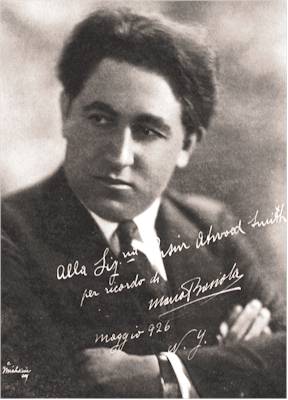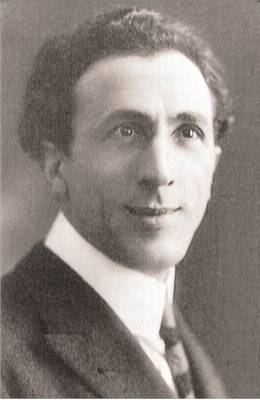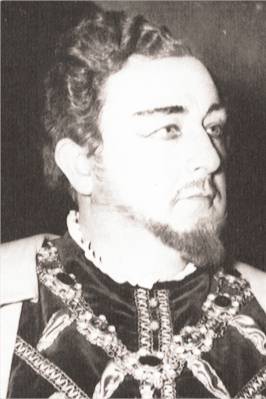The wealth of Italian baritones which enriched the period between the two wars has overshadowed certain singers of great interest who, although quite popular at the time, have fallen into oblivion when compared to the towering quintet of Mattia Battistini, Tita Ruffo , Giuseppe de Luca, Pasquale Amato and Riccardo Stracciari. Italy has produced some other fine baritones. Here are three of them: Mario Basiola, Apollo Granforte and Carlo Tagliabue. Mario Basiola (1892 - 1965)
Biographical notes: Born in Annico near Cremona he was a student of the famous Antonio Cotogni. Basiola made his debut in 1918, he subsequentley sang in Barcelona and Florence before spending some years in America. He joined the San Carlo Opera Company for three seasons, for the following seven seasons he appeared at Ravinia Park in Chicago. From 1925 - 1932 he sang at the Met where his roles included Amonasro, Alfio, Gérard, Germont-père, Escamillo, Barnaba and the Venetian Guest in Rimsky-Korsakov’s Sadko. After 1935 he returned to La Scala. He arrived at Covent Garden in 1939 where he was not successful! After war he taught singing in Australia.
Comment: His recordings show him as a singer with a flawless technique, based on the principles of the 19th century: Rich timbre, impeccable legato, excellent breath control. The old school emerges also in the clarity of diction and flexibility of dynamics. Lauri-Volpi explained that Basiola had learnt his roles “note for note, breath by breath, word for word and gesture by gesture” from his teacher Cotogni, and that it had been difficult for him to find his own personality. If you listen to his Largo al factotum (parlando!) or to A tanto amor you may disagree with the famous tenor. I never tire of listening of Vision fuggitiva (Erodiade).This singer belongs to the most stylish baritones of the century. He is undoubtedly a great artist, and still much underrated. If you prefer baritone voices with powerful expansion or “singing actors” like Bechi, Gobbi and the like, you will probably be disappointed.
Apollo Granforte (1886 - 1975)
Biographical notes:
Born into a poor family he worked as a cobbler until he was 18. He moved to Argentinia with his brother. There he worked in his trade he had learnt, but soon his vocal capabilities were
discovered, and he concentrated on singing. He enrolled as a student at The Buenos Aires Conservatory and studied for nine years! In 1913 he made his debut as Germon-père at the Opera
of Santa Fe. Subsequently he sang at various opera houses in South America. At the beginning of the war, he returned to Italy to fight at the front for Italy. In 1916 he appeared at The Teatro
Costanzi in Rome and at The Teatro da Verme in Milan. In 1921 he was engaged to La Scala, and stayed there as a member until 1939. He frequently appeared as a guest artist in Paris. Nellie
Melba chose him for an Australia tour with her own troup, he was also a guest at London Covent Garden. He took part in several Wagner operas, in roles such as Wotan, Kurwenal, Telramund and
The Wanderer. He also succeeded as Jochanaan and Boris Godunov. After retiring he became a singing coach in Ankara. For a brief span he was also the director of the National Theatre in
Prague. Afterwards he returned to Italy where he became a sought-after advisor on all matters related to singing.
Comment: His is a vibrantly powerful voice in “Ruffo-Tradition” though he never reached the excellent level (agilità) of the former singer. Granforte’s Iago belongs without doubt to the best portraits on record. It is true that his voice was of a good quality, but in my opinion his singing is not very subtle. You hear a big voice with a ringing top but to me he lacks flexibility and colors. He was considered an excellent actor. I particularly like him in the integral recordings in which he is a superb “singing actor.”
Carlo Tagliabue (1898 - 1978)
Biographical notes:
Carlo Tagliabue was born in Mariano Comense, a small village near Milan. He was taught by the maestri Gennai and Ghidotti and received a stipend from the publishing house Sonzogno in Milan.
His debut was 1921 in Lodi as Amonasro. After several appearances in various theatres he came to La Scala in 1929 at Toscanini’s behest. He appeared in 39 different roles at La Scala alone.
His conductors were de Sabata, Serafin, Guarnieri, Votto, Marinuzzi and Karl Böhm (who admired him as Wolfram). Further stations of his career were the Arena di Verona, Rio de
Janeiro, San Paolo, Lisbon, Wiesbaden and Vienna. In 1936 he sang at Covent Garden in a Gala performance on the occasion of the coronation of George VI. For two seasons he appeared at
the Met as Rigoletto, Amonasro and Marcello. His home remained La Scala, he belonged to its ensemble for more than 30 years until his farewell in a performance of La Traviata opposite Maria Callas and Gianni Raimondi in 1958. Until his death he lived in Monza near Milan and was a coach and advisor for young singers.
Comment: I admire the beauty and warmth of his voice and his phenomenal breath control. It is a pity that he was not able to record before 1939! He had to compete with baritones like Stracciari, Viglione-Borghese, Urbano and Galeffi! The arias from La Forza del Destino, Pari siamo and the Prologue from I Pagliacci are superbly sung. Il balen del suo sorriso is wonderfully sung, listen to the piani! The two Traviata arias (one recorded live in 1950) are superb. Very important his participation in two of my favorite integral recordings of Il Trovatore (Previtali) and La Forza del Destino (Marinuzzi).
|
||||||||||||||||||||||||||||||||||||||||||||||||||||||||||||||||||||||||||||||||||||||||||||||||||||||||


